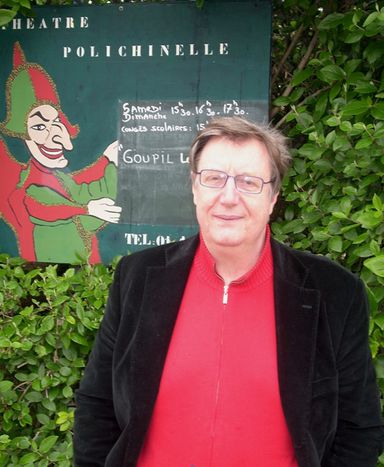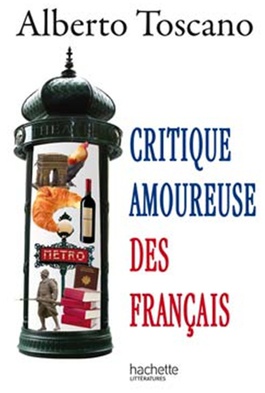
Alberto Toscano: ‘The French will be happier the day they free themselves of the need to be normal’
Published on
Translation by:
 jennifer o'boyle
jennifer o'boyle
The political journalist and polemist, 61, has been living in France for more than twenty years, and wonders if he gave French president Nicolas Sarkozy the literary impetus to marry a crooning Italian woman - interview of the week
In the middle of his book tour, Alberto Toscano agrees to meet me in Georges Brassens square in Paris’ fifteenth arrondissement, to talk about his career and what lead him to write a favourably insightful book detailing the ideas the French have about themselves. A car pulls up and the journalist and writer steps out in a whirlwind of enthusiasm for literature. We work our way through many copies of his books as well as several bottles of wine. After our meeting, he willingly attends a series of book signings at the bargain book stand amid his bookseller friends.
Toscano’s special relationship with France is built on a number of key dates. Born in 1948, he turned twenty in 1968. As a student in Milan, he became involved in 68’s double sided revolution, both in protest and promotion of liberty and levity. Alberto Toscano made many visits to France; in 1977 he spent a year at the CFPL (centre for studies of press and journalism) in Paris with Hubert Beuve-Méry as course director, the founder of the daily Le Monde. In 1981 he returned to cover the presidential elections and met key figures such as former EU commission president Jacques Delors and late French politician Pierre Mendès-France, who was one of the last people Toscano interviewed before the latter died in 1982, he points out with a hint of pride. In 1986 he moved permanently, or almost since according to his motto ‘life is so varied, nothing is certain'. He was first a correspondent for an Italian financial daily, and later wrote chronicles across a wide range of Italian and French media (including TV5, France Culture, RTL and La Croix to name but a few).
The ‘exceptional’ French
 In 2006 Alberto Toscano had already written his book France Italie: Coups de tête, coups de cœur ('France-Italy: Head butts and Sweethearts', Tallandier 2006). He reoffended three years later with Critique amoureuse des français (‘Affectionate critique of the French’, Hachette, 2009). Whilst he had wanted to discuss his personal opinions from the perspective of an Italian living in France during his first masterpiece, his new work is based on the stereotypes that the French have about themselves.
In 2006 Alberto Toscano had already written his book France Italie: Coups de tête, coups de cœur ('France-Italy: Head butts and Sweethearts', Tallandier 2006). He reoffended three years later with Critique amoureuse des français (‘Affectionate critique of the French’, Hachette, 2009). Whilst he had wanted to discuss his personal opinions from the perspective of an Italian living in France during his first masterpiece, his new work is based on the stereotypes that the French have about themselves.
The serious and amusing forty-eight chapters are the fruit of thorough research. ‘My writing style aims to entertain the reader but at the same time I do want to pass on a message,’ Toscano points out. He points out a specific passage within the copy that he signs for me; his double perspective, which is both polemic and affectionate, engenders the tone of his work with morals are concerned in particular. ‘The French often suffer from their ancestral (and totally useless) need to prove themselves to both themselves and to others. They need to prove that they are totally ‘exceptional’. In my opinion, they will be a whole lot happier the day that they free themselves of the need to be ‘normal’; the same as every other person in Europe or the rest of the world.’
For him, the French ‘have received a lot of compliments but, unluckily for them, instead of being happy about that, they always feel the need to compete with the best and burden themselves with the mission to do that.’ This way of thinking, which does not exist on the other side of the Alps, indicates a sense of ambition, yet also a lack of self confidence at the same time. ‘The eldest child of the church feeds certain dangerous and useless feelings of nostalgia, which politicians take advantage of in their speeches. It’s like she’s on a downhill slope.’ Toscano is offended by this. ‘Downhill in what regard? In regards to the colonial empire yes, but is it not better to have banned the kind of torture that was witnessed in old French Algeria? We are forgetting that before it was colonial, immigration was first of all European.’ Toscano also informs me that a quarter of all French people have Italian blood and that the French national instrument, the accordion, was brought to France in the nineteenth century by immigrants from Bergamo.
A quarter of all French people have Italian blood
Between these two Latin sisters, there is a mutual love which is tinted with tenderness but also animosity. In his first book Toscano concluded ‘let’s marry them. He comments that he did not know if he had made the right conclusion since, as he himself admits, ‘I didn’t think that an Italian singer and model, Carla Bruni, would become the wife of the president of the French Republic. It seems that Nicolas Sarkozy took me literally.’
In love with Europe
As a staunch European who titles himself a ‘europeiste’, Toscano believes that the European elections between 4 and 7 June 2009 will be held in a less than ideal context. For him, the ‘European institutions or more exactly, the European parliament, are considered almost in a second division rather than in a place of power. We see this in the political big wigs that aren’t running or will do just to step down soon after,’ he discusses, quoting the example of Rachida Dati, the French justice minister who has been put forward as a candidate by Sarkozy’s UMP ('union for a popular movement') party as a form of pushing her out of the government.
As soon as one choice fails, Paris tends to put the blame on Brussels
These elections will be somewhat more like a national political survey in a time of crisis. Toscano deplores all this, since the role of France within Europe is and has been predominant since the 1950s. ‘In the referendum of 29 May 2007, France was one of the countries responsible for short circuiting the machine. We are still waiting for it to fix that break.’ As soon as one choice fails, Paris tends to put the blame on Brussels. It forgets how much it benefits from European politics. Toscano points out the controversial example of farming: ‘If the French had to eat everything it produced, they would all die of obesity!’
Throughout our conversation, Toscano has remained both professional and approachable. He opens himself up, enthusing all around him with his taste for classic Italian cinema, food, writing, his dislike of intolerance - even that of those who hold the same beliefs as him. ‘I never thought that the day I retired would be a happy one,’ he concludes. With his enthusiasm, he enthuses us all.
Translated from Alberto Toscano : « Sarkozy me prend au pied de la lettre »


